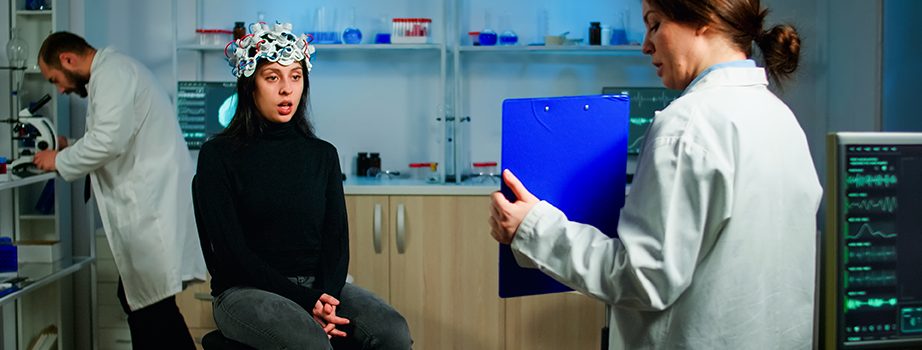
Inpatient vs. Outpatient Rehab
October 27, 2021
Is Acupuncture a Legitimate SUD Therapy?
November 4, 2021Biofeedback is the concept of changing something about a human biological process, often using instruments to enable the specific process to be isolated and tracked. The end goal is to help a person affect changes to a specific bodily function at will.1,2,3 The use of accurate instruments and a conscious approach makes it possible for a wide range of bodily processes to be tracked and changed effectively.3
While biofeedback therapy was initially developed to help with physical conditions, such as incontinence, constipation, and pain, to name a few, it has since become an important tool for treating mental health conditions, including substance use disorder (SUD).1,2
What Bodily Functions Can Biofeedback Therapy Change?
The basic principle of biofeedback therapy is, anything biological function that you can measure, you can change. At least within reason. While it’s not completely understood how biofeedback works, this basic principle of biofeedback has held true for a wide variety of human biological functions.1,2,3,5
Some of the functions relevant to SUD treatment that could be changed through biofeedback therapy include the following:1,2,3,5
- Breathing
- Heart rate
- Muscle activity
- Brainwaves (EEG)
- Blood pressure
- Pain
Why Is It Used in SUD Treatment?
The primary application of biofeedback therapy in SUD treatment is as part of relapse prevention and as a way to manage co-occurring mental health conditions.2,3,4,5
Cravings related to substance use disorder tend to manifest physical effects similar to a panic disorder. Elevated heart rate, sweating, feeling faint, nausea, a feeling of doom, and pain, particularly in the jaw, neck, chest, and shoulders may sometimes accompany intense cravings for drugs or alcohol.4
Controlling these symptoms can help prevent recovering individuals from getting too overwhelmed, which in turn, may help them better avoid the urge to take substances.3,4
Additionally, recovering individuals who have co-occurring mental health conditions that trigger drug use such as post-traumatic stress and anxiety can use biofeedback therapy to better control the symptoms of those conditions as well.3
How is Biofeedback Therapy Given?
Biofeedback therapy can be implemented in several different ways. However, they all involve the use of sensors, computers, and other devices for gathering, analyzing, and presenting the data to the patient. They can then track a specific bodily function and begin learning how to control it.1,2,4,5
Meditative practices or psychotherapy may be employed to help the patient better control these specific body functions. Later on, as they become more attuned to what’s going on with their body, they may need to rely on sensors and computers less.
Notably, modern wearable devices and smartphone technology now allow biofeedback to be done virtually anywhere, allowing different bodily functions to be monitored in real time. This data can be automatically sent to clinicians, allowing them to see if patterns of stress throughout the day.1
Does Biofeedback Replace Other Therapy?
Biofeedback is not intended to replace mainstream SUD treatments such as psychotherapy or medication-assisted therapy. Rather it’s intended to supplement those treatments and further improve on them. Biofeedback therapy is rarely used by itself for treating SUD and is almost always part of a holistic treatment approach.1,2
If you’re interested in using biofeedback as part of SUD recovery or for other improvements in your mental health, please get in touch with a qualified psychiatrist.
Find Options for Biofeedback Therapy in Boston
Biofeedback therapy can be a very useful way to not only control cravings for drugs or alcohol, but it may also be a good way to develop a better awareness of processes happening within your body. Modern wearables and smart technology also enable the wider application of biofeedback therapy outside of a clinical setting, making it more useful to a wider range of individuals.1,2,3
However, to be effective, biofeedback therapy needs to be applied in the right contexts and with specific goals in mind. If you’re in New England, Boston Drug Treatment Centers can put you in touch with treatment and rehabilitation programs with experience in the use of biofeedback and other evidence-based interventions. Call our team at (857) 577-8193 to discuss your recovery options.
Resources
- Alayan, N., Eller, L., Bates, M. E., & Carmody, D. P. (2018). Current evidence on heart rate variability biofeedback as a complementary anticraving intervention. The Journal of Alternative and Complementary Medicine, 24(11), 1039-1050.
- Eddie, D., Kim, C., Lehrer, P., Deneke, E., & Bates, M. E. (2014).A pilot study of brief heart rate variability biofeedback to reduce craving in young adult men receiving inpatient treatment for substance use disorders. Applied psychophysiology and biofeedback, 39(3-4), 181-192.
- Futterman, A. D., & Shapiro, D. (1986). A review of biofeedback for mental disorders. Psychiatric Services, 37(1), 27-33.
- Australian Government Department of Health and Ageing & National Drug and Alcohol Research Centre. (2011). Anxiety + Substance Use.
- Goessl, V. C.; Curtiss, J. E.; Hofmann, S. G. (November 2017). The effect of heart rate variability biofeedback training on stress and anxiety: a meta-analysis. Psychological Medicine. 47 (15): 2578–2586. doi:10.1017/S0033291717001003.

